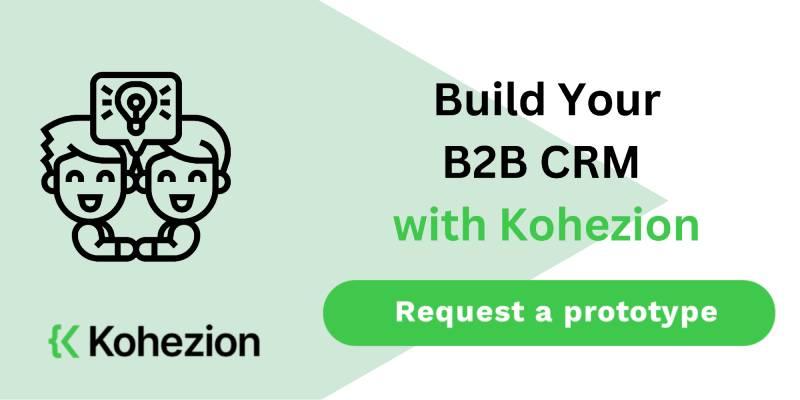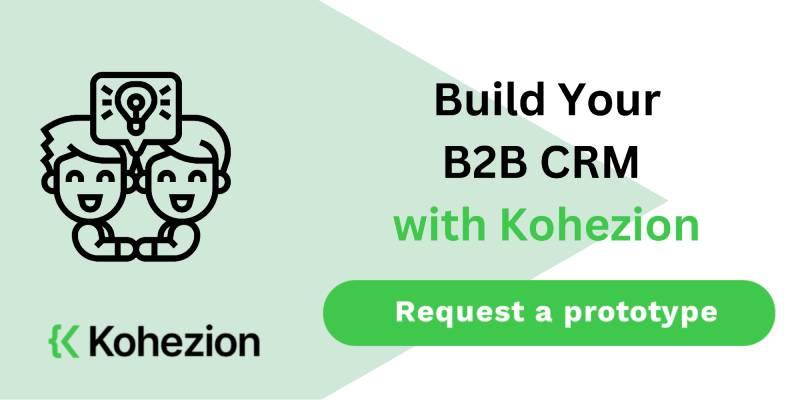Did you know that 91% of organizations with over 11 employees use CRM software? This shows how important CRM is for B2B, helping to connect business goals with customers' needs.
This guide will discuss the benefits of using a CRM for a B2B system and help you find the right solution for your business.
What is CRM for B2B
CRM for B2B is a special customer relationship management system for business-to-business interactions. These systems help companies manage their relationships with other businesses. They offer key CRM functionalities for complex needs not seen in B2C scenarios.
B2B CRM puts customer data in one place, giving insights for better decisions. It helps your team keep track of customer interactions from start to finish. The benefits of B2B CRM are clear when you look at the need for better teamwork and communication between businesses. It improves data handling, automates routine tasks, and gives clear insights into customer actions. This leads to more productivity and sharper sales strategies.
Why is CRM for B2B Important
B2B sales have longer cycles, so effective customer management is vital. A good CRM system helps streamline processes and improve communication with clients.
CRM increases team productivity and keeps all information in one place. This lets sales teams quickly find client data and manage interactions smoothly. It saves time and ensures quick responses, building customer loyalty.
The CRM impact on sales is huge. It uses analytics to spot trends and problems. This helps tailor messages to your audience, leading to more sales and stronger customer ties.
Benefits of CRM for B2B
CRM for B2B systems offer many benefits that help your sales strategies work better and more efficiently.
Automate Repetitive Tasks
One big plus of CRM for B2B is automating simple tasks. This lets you focus on important tasks, manage your time better, and be more productive.
Seamlessly Manage Customer Data
CRM systems are great for keeping all customer info in one place. This makes it easier for teams to work together and manage customer interactions well. Using a CRM system also means you can quickly find the data you need to make smart decisions.
Stay Organized Anywhere
With CRM, you can stay organized no matter where you are. Whether you're at the office or out on the road, you can easily access important customer data. This keeps your team on the same page and working well together.
Identify Roadblocks in Your Sales Process
CRM helps you spot issues that slow down your sales. This feature supports sales process improvement. It lets you make quick changes and prepare your team to handle any challenges.
Launch Targeted & Personalized Campaigns
CRM lets you create marketing campaigns that really speak to your audience. Personalizing your approach can engage more people and create happier customers.
Strengthen Communication
A CRM improves both how your team talks to each other and how you talk to customers. Better communication helps build stronger relationships.
Gain Powerful Customer Insights and Identify Areas for Growth
Another big plus of CRM advantage is the data insights it offers. Understanding what customers like and want helps you improve your services and find new ways to grow.
Make Informed Decisions
Having all your customer data in one place helps you make choices based on facts. Better insights lead to smarter strategies that match your business goals well.
Increase Sales
All the benefits of CRM systems add up to more sales. With better efficiency, targeted marketing, and stronger customer relationships, your revenue is likely to grow.
Improve Customer Retention
Using CRM tools well can also help keep customers coming back. Happy customers are more likely to stay with you, which means a steady income and a strong future for your business.
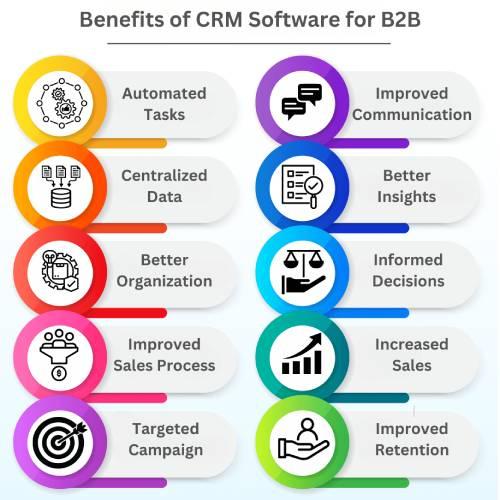
Top 10 CRM for B2B Software Solutions
Here are the top 10 CRM software solutions that can help you achieve your goals.
1. Kohezion
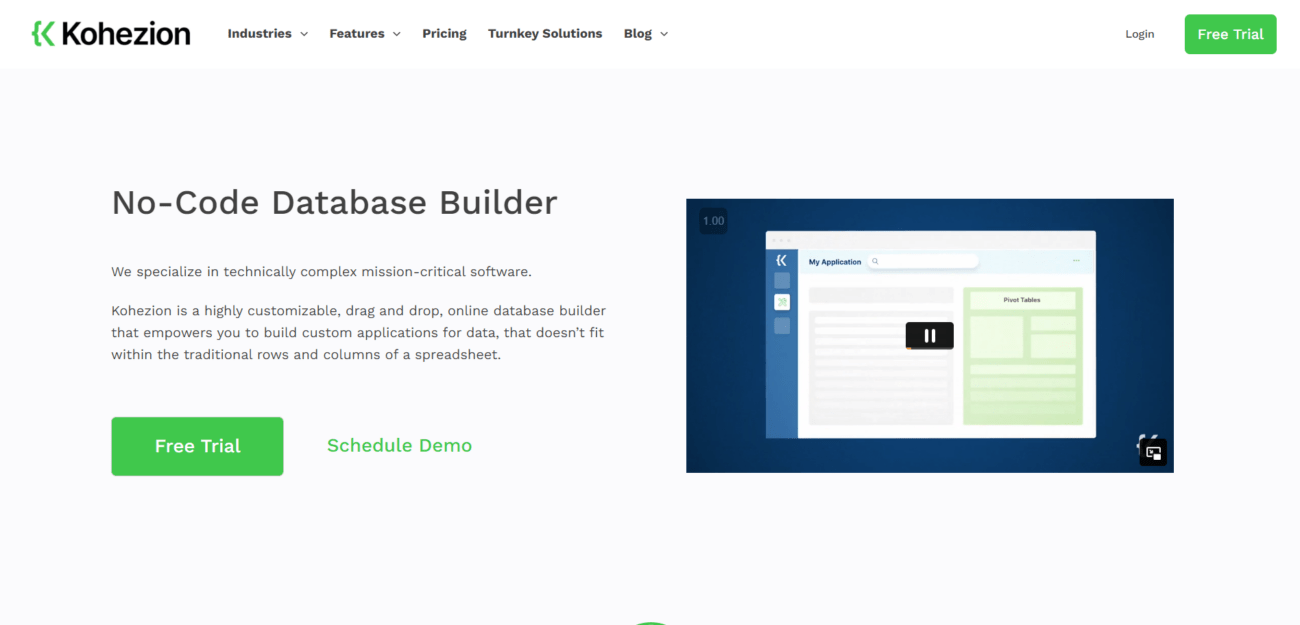
Kohezion is a versatile CRM platform tailored for B2B businesses, focusing on customizability and scalability. It allows users to build customized applications that cater specifically to their business needs, making it a powerful tool for managing client data and streamlining operations. With a user-friendly interface, Kohezion offers flexibility in data management, helping companies organize their workflows effectively.
Top 5 Features:
- Customizable applications to fit unique business needs
- Advanced data management tools
- User-friendly drag-and-drop interface
- Role-based access control for security
- Robust reporting and analytics features
5 Benefits:
- Improves data organization and accessibility
- Supports business scalability
- Improves workflow efficiency with customization
- Strengthens data security with role-based access
- Provides valuable insights with powerful reporting
2 Cons:
- Requires initial setup time for customization
- Limited third-party integrations compared to larger CRMs
Best For:
Small to medium-sized B2B businesses needing customizable CRM solutions.
2. HubSpot CRM
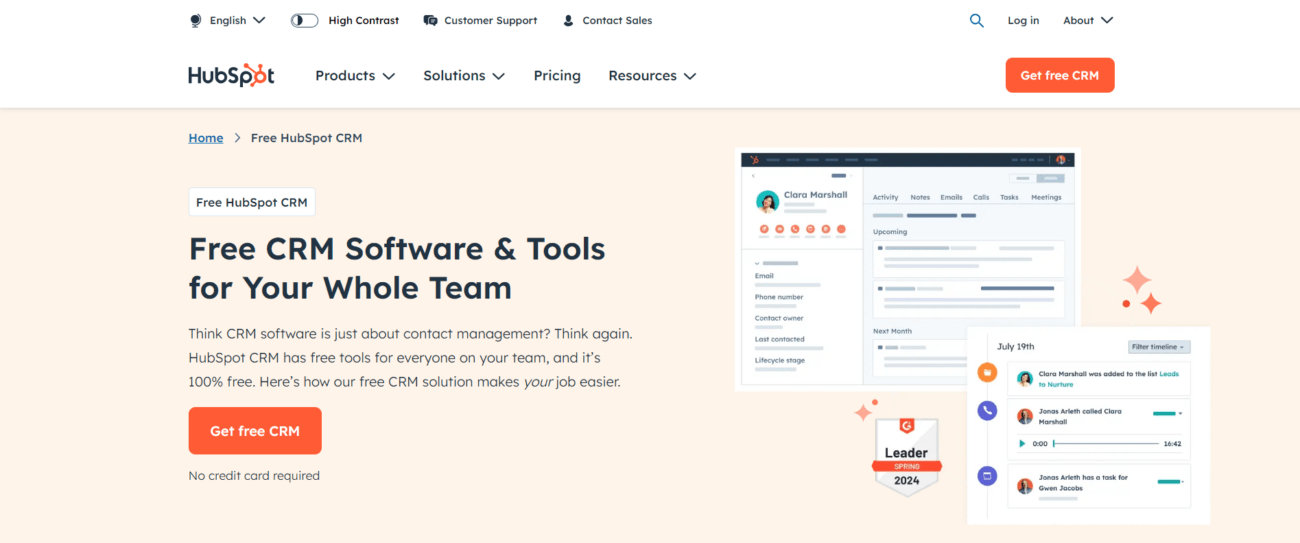
HubSpot CRM is a widely used, comprehensive CRM platform that offers a full suite of tools for marketing, sales, and customer service. It's known for its ease of use and seamless integration with other HubSpot tools, making it ideal for businesses looking to manage their entire customer journey from a single platform. With powerful automation features and detailed analytics, HubSpot CRM is a go-to choice for many B2B companies.
Top 5 Features:
- All-in-one marketing, sales, and service platform
- Built-in email tracking and engagement analytics
- Powerful automation tools for workflows
- Seamless integration with other HubSpot products
- Customizable dashboards and reporting
5 Benefits:
- Streamlines customer relationship management across departments
- Improves sales and marketing alignment
- Increases efficiency with automation
- Provides deep insights into customer behavior
- Easy to scale with business growth
2 Cons:
- Some advanced features require paid plans
- Can be overwhelming for smaller teams
Best For:
Businesses looking for an all-in-one CRM solution with integrated marketing and sales tools.
3. ActiveCampaign
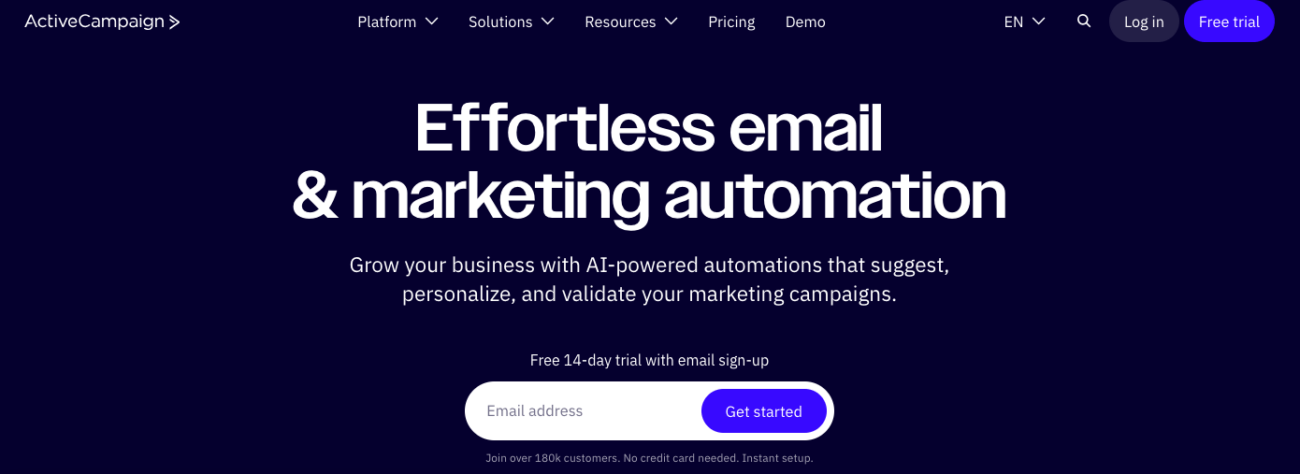
ActiveCampaign is a CRM platform known for its robust email marketing and automation capabilities. It's designed to help businesses create highly personalized marketing campaigns and manage customer relationships effectively. With its powerful automation, ActiveCampaign allows B2B companies to streamline their sales processes and improve customer engagement.
Top 5 Features:
- Advanced email marketing automation
- Comprehensive customer segmentation tools
- CRM with integrated sales automation
- Personalized messaging and dynamic content
- Detailed customer behavior tracking
5 Benefits:
- Improves customer engagement with personalized communication
- Improves sales efficiency with automation
- Streamlines marketing efforts with robust segmentation
- Provides insights into customer behavior
- Easy to integrate with other tools and platforms
2 Cons:
- Learning curve for advanced automation features
- Limited functionality on lower-tier plans
Best For:
B2B companies focusing on email marketing and sales automation.
4. Salesforce CRM
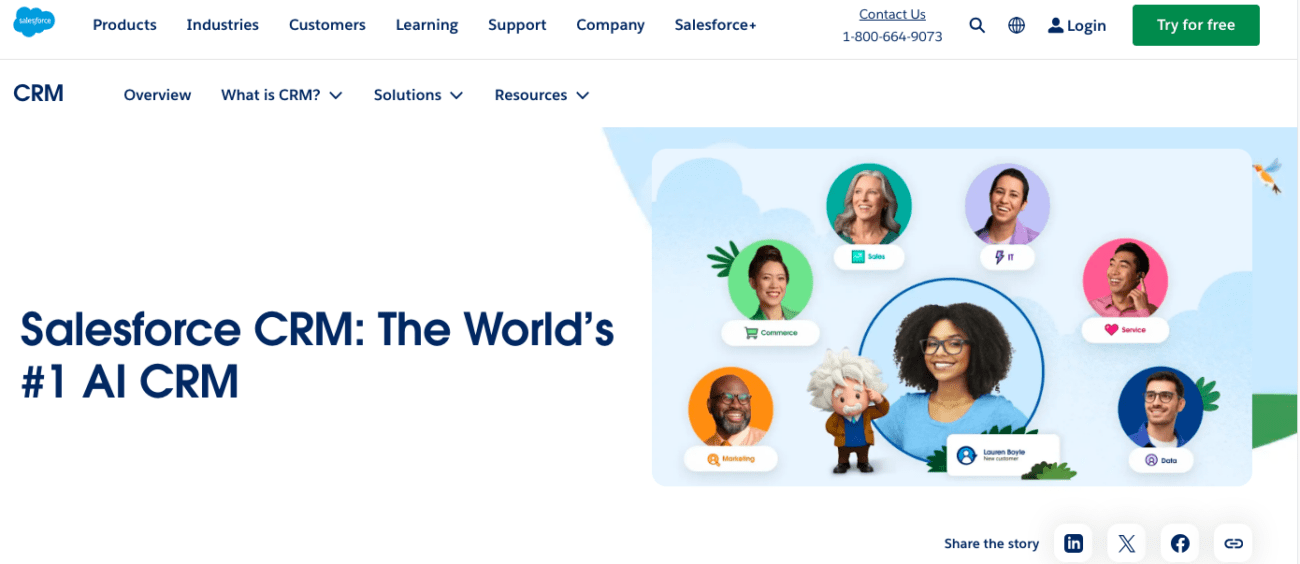
Salesforce CRM is among the most powerful and widely recognized CRM platforms globally. It offers extensive sales, marketing, customer service, and analytics features, making it a top choice for large enterprises and growing businesses. Salesforce CRM's cloud-based solution is highly customizable, allowing companies to tailor the platform to their needs.
Top 5 Features:
- Extensive customization and scalability
- Comprehensive sales and marketing automation
- Advanced analytics and reporting tools
- Robust third-party integrations
- Cloud-based platform with mobile access
5 Benefits:
- Supports business growth with scalable solutions
- Increases sales and marketing efficiency
- Provides deep insights with powerful analytics
- Enables seamless integration with other tools
- Accessible anywhere with cloud and mobile support
2 Cons:
- High cost, especially for advanced features
- Complex setup and customization process
Best For:
Large enterprises and businesses requiring highly customizable CRM solutions.
5. Bigin
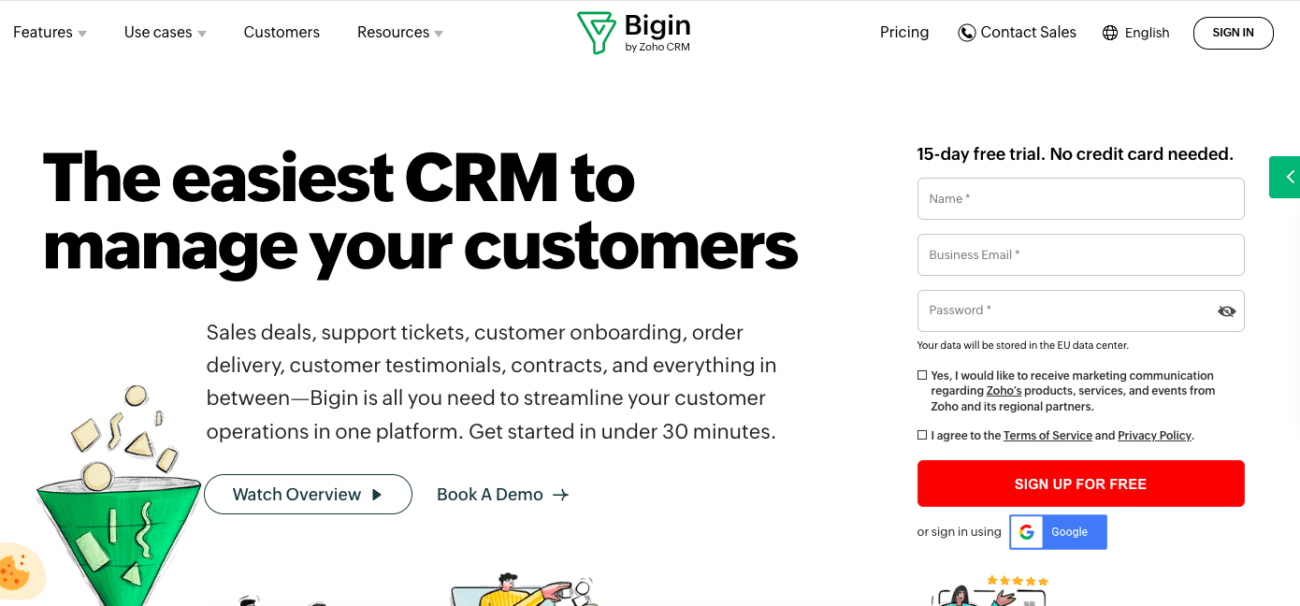
Bigin by Zoho CRM is a simple yet powerful CRM tool designed specifically for small businesses. It offers essential CRM features like pipeline management, email integration, and automation in an easy-to-use interface. Bigin is an excellent choice for B2B businesses just starting with CRM, providing all the necessary tools without overwhelming complexity.
Top 5 Features:
- Simple pipeline management
- Integrated email communication tools
- Basic workflow automation
- Customizable dashboards
- Mobile app for on-the-go access
5 Benefits:
- Easy to use for beginners
- Improves sales pipeline visibility
- Improves communication with integrated email
- Streamlines processes with simple automation
- Accessible from anywhere with mobile support
2 Cons:
- Limited features compared to more advanced CRMs
- Not ideal for larger businesses or complex needs
Best For:
Small B2B businesses and startups looking for a straightforward CRM solution.
6. Zendesk Sell
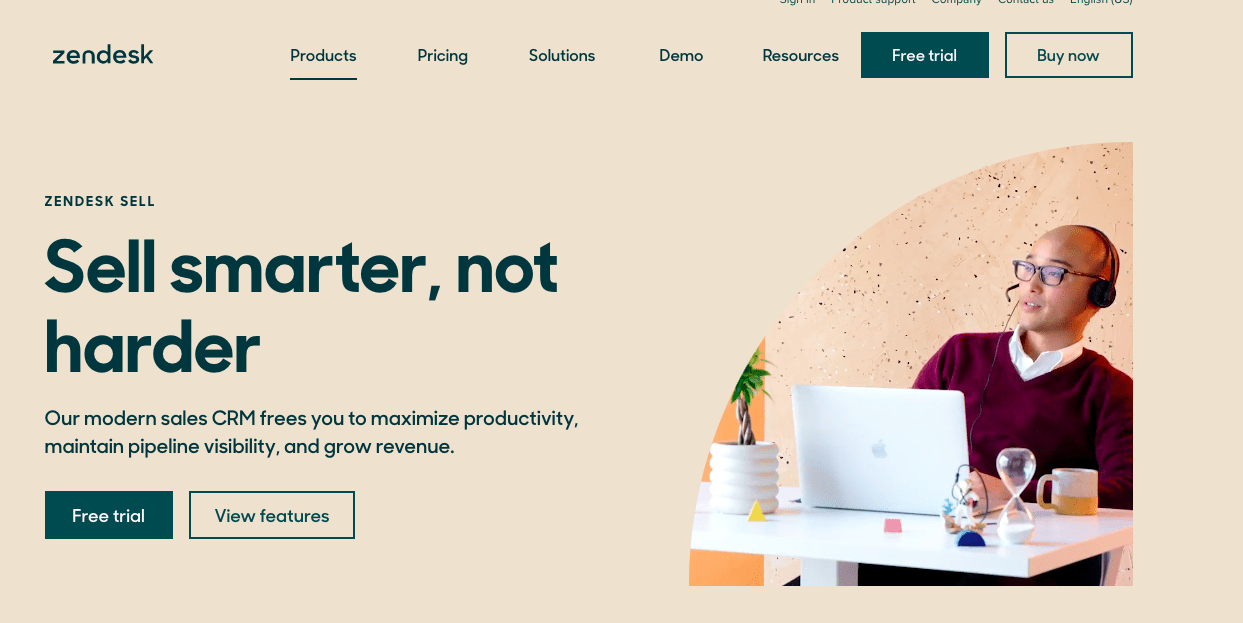
Zendesk Sell is a CRM platform that improves sales productivity and pipeline visibility. It offers a streamlined interface and powerful tools for tracking leads, managing contacts, and automating sales tasks. Zendesk Sell is particularly well-suited for businesses that want to integrate their CRM with customer support and other Zendesk products.
Top 5 Features:
- Intuitive sales pipeline management
- Seamless integration with Zendesk support tools
- Automated task management and follow-ups
- Advanced lead and deal tracking
- Customizable reporting and analytics
5 Benefits:
- Improves sales team efficiency
- Improves visibility into sales pipelines
- Streamlines sales processes with automation
- Strengthens customer relationships with integrated support
- Provides actionable insights
2 Cons:
- Limited customization options
- Higher cost compared to similar tools
Best For:
Businesses using Zendesk products, seeking an integrated sales CRM solution.
7. ClickUp
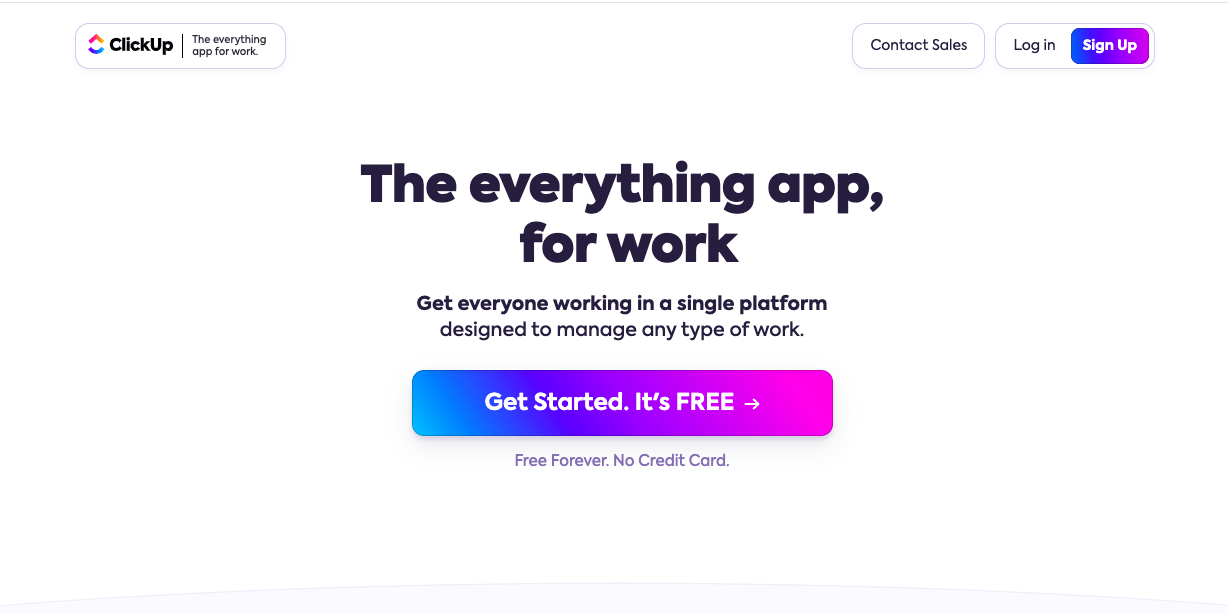
ClickUp is a versatile project management tool that also offers CRM capabilities. It allows businesses to manage tasks, projects, and customer relationships all in one place. Its customizable interface and robust feature set make it ideal for teams that want to be flexible in managing their workflows and customer interactions. ClickUp’s CRM features include task management, customer tracking, and reporting, making it a solid choice for B2B companies.
Top 5 Features:
- Customizable workflows and dashboards
- Integrated task and project management
- CRM features for customer tracking
- Collaboration tools for team communication
- Time tracking and reporting
5 Benefits:
- Centralizes project and customer management
- Improves team collaboration
- Increases productivity with integrated tools
- Provides flexibility with customizable workflows
- Improves time management with tracking features
2 Cons:
- CRM features are less comprehensive than dedicated CRM platforms
- Steeper learning curve due to extensive features
Best For:
Teams that need a combined project management and CRM solution.
8. Freshsales
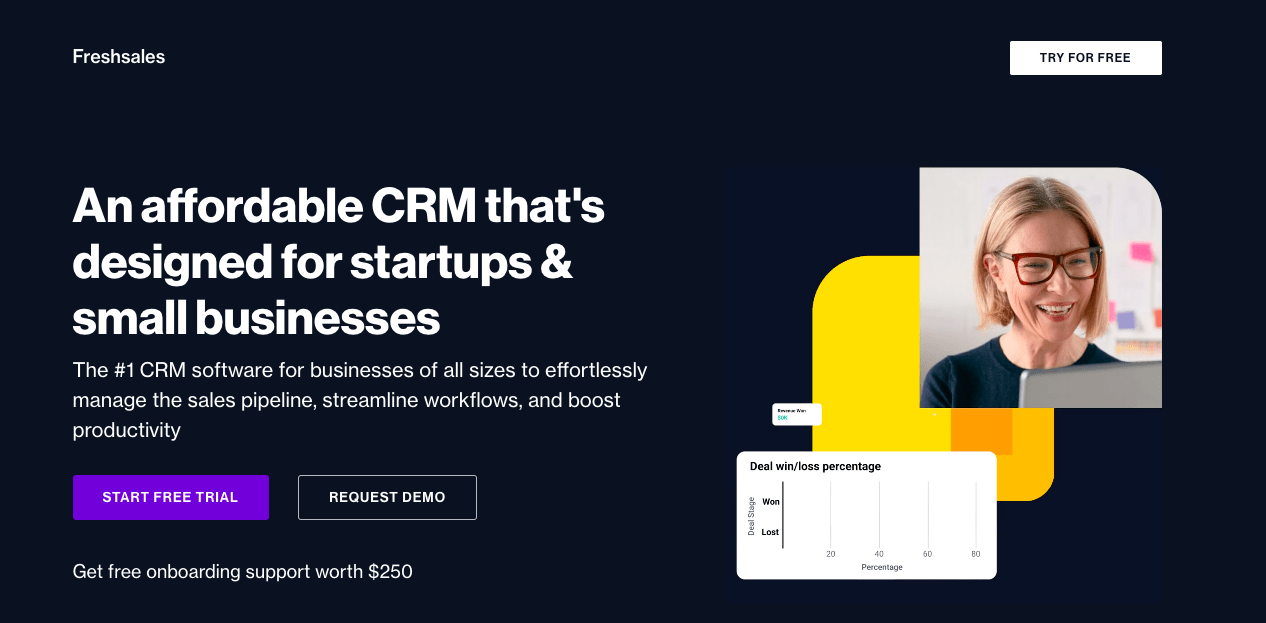
Freshsales, part of the Freshworks suite, is a user-friendly CRM for high-growth sales teams. It offers built-in phone, email, and chat features, along with AI-powered lead scoring and automation tools. Freshsales is an excellent choice for B2B companies looking to streamline their sales processes and improve lead management.
Top 5 Features:
- Built-in phone, email, and chat functionality
- AI-powered lead scoring
- Sales automation workflows
- Visual sales pipeline management
- Customizable reporting and analytics
5 Benefits:
- Improves communication with built-in tools
- Improves lead prioritization with AI scoring
- Streamlines sales processes with automation
- Increases pipeline visibility
- Provides actionable insights with custom reports
2 Cons:
- Limited customization for advanced users
- Higher tiers required for advanced features
Best For:
Growing B2B sales teams needing integrated communication and lead management tools.
9. Nutshell CRM
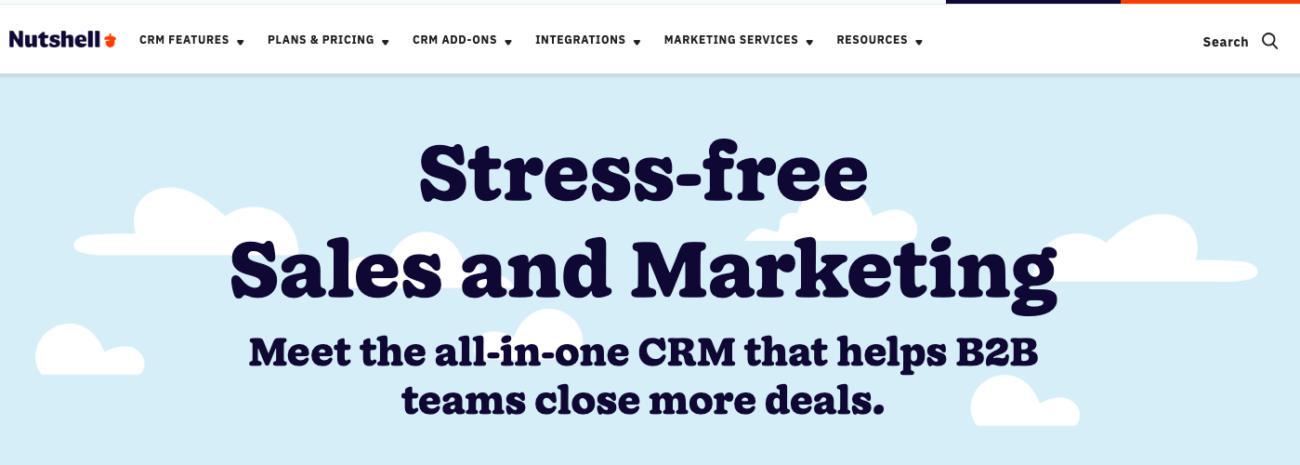
Nutshell CRM is a simple and affordable solution for small to medium-sized businesses. It offers all the essential features needed for effective sales management, including contact management, pipeline tracking, and sales automation. Nutshell’s intuitive interface and affordable pricing make it a great option for businesses new to CRM software.
Top 5 Features:
- Easy-to-use contact management
- Visual sales pipeline tracking
- Sales automation tools
- Built-in email marketing
- Customizable reports and dashboards
5 Benefits:
- Simplifies sales management
- Improves pipeline visibility
- Improves sales efficiency with automation
- Supports marketing efforts with email integration
- Affordable pricing for small businesses
2 Cons:
- Limited third-party integrations
- Less suited for larger or complex sales teams
Best For:
Small to medium-sized businesses needing an affordable and straightforward CRM.
10. Pipedrive
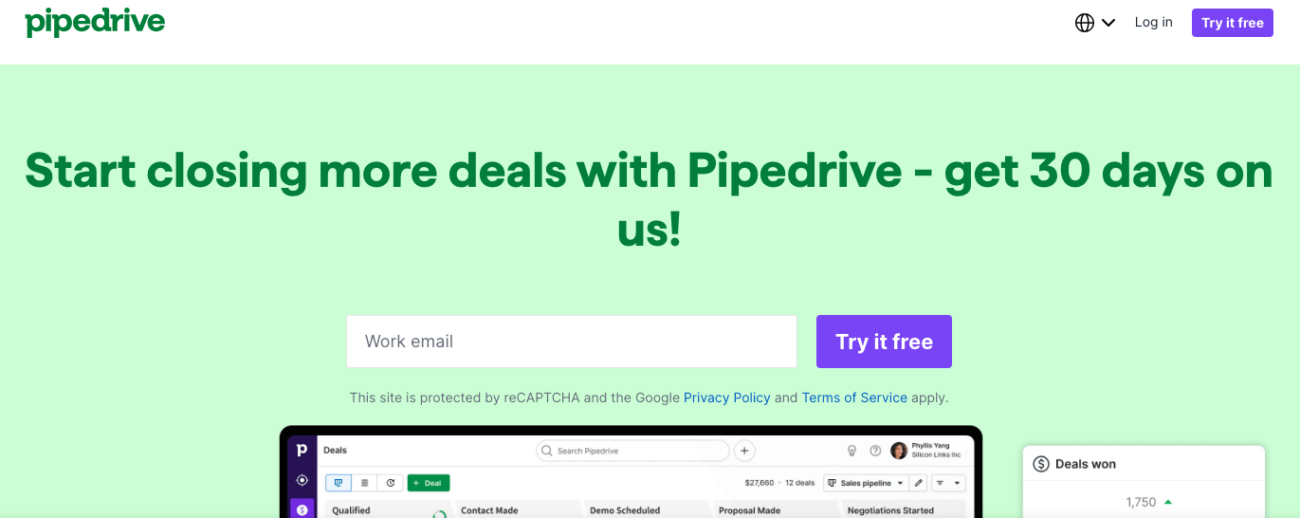
Pipedrive is a sales-focused CRM designed to help businesses manage their sales pipelines effectively. With its intuitive drag-and-drop interface and robust automation features, Pipedrive is ideal for B2B companies looking to optimize their sales processes. It offers a range of tools for tracking deals, managing contacts, and automating repetitive tasks, making it a powerful tool for sales teams.
Top 5 Features:
- Visual sales pipeline management
- Customizable automation workflows
- Integrated email and communication tools
- Deal and contact tracking
- Detailed sales reporting and forecasting
5 Benefits:
- Improves sales pipeline visibility
- Increases efficiency with automation
- Improves communication with integrated tools
- Provides insights for better sales forecasting
- Easy to use with a drag-and-drop interface
2 Cons:
- Limited marketing automation features
- Can become expensive with add-ons
Best For:
Sales teams focused on pipeline management and sales process optimization.
Top Features in CRM for B2B Software
When looking at B2B CRM features, focus on what helps your business run smoothly. Knowing what to look for in CRM software improves customer relationship management. The right CRM tools make processes easier and increase productivity.
Lead Management
Good lead management helps track potential customers from start to finish. It supports better lead nurturing, making sure you don't miss out on chances. With it, you can focus on really interested contacts, which helps your sales plan.
Data Management
Strong data management keeps customer information tidy and easy to find. This lets teams make quick decisions and better communicate with customers.
Customization Options
Customizing your CRM is key to fitting it to your business needs. You can change dashboards, reports, and workflows to match your process, improving the CRM for users and increasing efficiency.
Third-Party Integrations
Working with other apps makes sharing info smooth. This lets you link your CRM with what you already use, making things more efficient. Integrations allow you to automate tasks and keep data the same across systems.
Remote Access
Being able to work from anywhere lets your team stay productive no matter where they are.
Team Collaboration
Tools for team collaboration keep your team working together well. They help with talking and managing projects. Improved teamwork means that everyone knows what to do, which leads to better strategy success.

CRM for B2B Best Practices
Using CRM best practices helps improve customer relationships and your sales process. Focus on these areas to improve your CRM performance.
Leverage CRM Automation
Automation tools make tasks like sending emails and following up easier. This reduces mistakes and makes your workflow more efficient. Automating these tasks allows you to use your time and resources better, allowing you to focus more on the big picture of your business.
Make Use of Your Data
Your data is full of valuable insights. Regularly checking reports and tracking customer interactions enables you to find important trends and growth chances. Knowing what customers like helps you tailor your approach, increase sales, and improve engagement. Using your data well helps you make the most of CRM and improve your B2B strategies.
Develop Targeted Advertising Campaigns
Good ads use insights from your CRM system. Creating campaigns based on customer profiles leads to more engagement and better marketing results. Matching these targeted efforts with CRM best practices lets you see big improvements in getting leads and sales.

How to Select the Right CRM for Your B2B Company?
Choosing the right CRM needs a strategic plan that fits your company's goals and needs. Try to understand what your business goals are. This ensures the CRM you pick matches your vision. Look at specific criteria for CRM evaluation that meet B2B needs.
Identify Your Business Goals
First, set clear business goals. Are you aiming to keep customers, increase sales, or improve marketing? Knowing your goals helps you choose the right CRM software for your needs.
Ensure the Software Is B2B-Friendly
Not every CRM is made for B2B. Make sure the software can handle B2B complexities like long sales cycles and many decision-makers. This is key to better communication and customer management.
Consider the Size of Your Business
Your business size affects CRM choice. Small businesses might want easy-to-use and affordable options, while large companies need advanced features and customization. Knowing your size and growth plans helps you pick a CRM that grows with you.
Plan for Future Growth
Choose a CRM solution that fits your current needs and can grow with you. This way, you can adapt to market changes and business growth without changing your CRM system often.
Steer Your B2B Business Toward a Brighter Future with Kohezion
Kohezion offers CRM solutions made just for B2B businesses. It helps you meet your goals and improve your business processes.
Kohezion has strong analytics that give your team insights to make better decisions and engage with customers. Kohezion is a smart choice to help your company grow and stay ahead in a fast-changing market.
The platform improves teamwork and helps businesses quickly adapt to new market needs. Using Kohezion CRM, you prepare your business for the complex world of B2B, setting it up for a brighter, more successful future.
Conclusion
Using a specialized CRM for B2B makes your sales process smoother and improves customer interaction. These tools help manage data better, automate tasks, and tailor communication. Knowing these benefits helps you pick the right CRM for your business.
Choosing the right CRM, like Kohezion, helps you build strong customer relationships for growth and profit. For more information on how Kohezion can support your business, contact us today.
Start building with a free account
Frequently Asked Questions
A CRM system organizes and tracks all potential leads in one place. It helps businesses manage their interactions with prospects, ensuring no opportunities are missed. A CRM can also automate tasks like follow-ups and lead nurturing, making the lead-generation process more efficient and effective.
A B2B CRM system provides a unified view of customer data, which leads to more aligned sales and marketing teams. It allows for better targeting and personalization in marketing campaigns, which can lead to more effective sales strategies. The CRM also tracks customer interactions and sales activities, helping businesses measure the success of their plans and make data-driven decisions.
The main difference between a B2B and a B2C CRM system is the focus on customer relationships. B2B CRM systems are designed to manage complex relationships with other businesses, often involving multiple contacts within each organization. In contrast, B2C CRM systems focus on individual consumers and usually handle more transactions but with simpler interactions.
CRM systems in B2B have various applications, including managing customer relationships, tracking sales pipelines, and automating marketing efforts. They help businesses organize and store detailed information about their clients, making it easier to maintain long-term relationships. CRM systems can also be used to analyze customer data, improve customer service, and identify opportunities for cross-selling and upselling.
